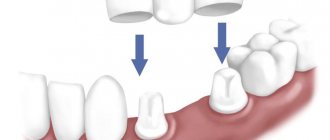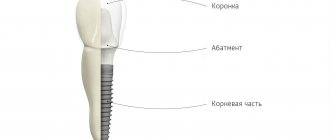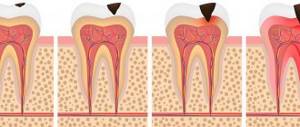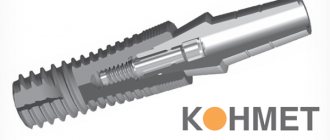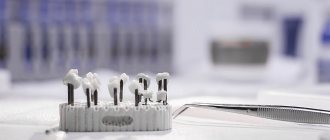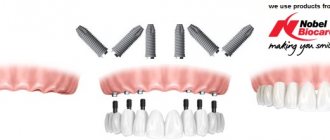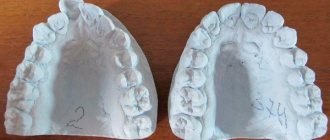Of course, every patient at a dental clinic, before deciding on dental implantation, wants to know how long artificial teeth will last.
It should be understood that the guarantee from the manufacturer of a titanium implant cannot extend to the entire structure of the artificial tooth and, even more so, to the survival rate of the implant itself in the bone. The manufacturer provides a guarantee only for the integrity of the implant as such. It can last 10 or 20 years, which cannot be said about the entire structure. However, an absolutely intact implant can also be rejected by the body much earlier than the warranty period.
What does the manufacturer guarantee?
The warranty period for the integrity of the implant varies from manufacturer to manufacturer. Moreover, premium implants come with a lifetime warranty. Such products are very expensive.
Titanium implants from the mid-price segment are usually guaranteed for 10-25 years. Agree, the gap is very large. However, much here depends not so much on the quality of the implant, but on the prestige of the manufacturer.
Finally, the most inexpensive economy-class implants have a warranty period of 10 to 15 years.
However, in practice, everything does not look so rosy. The fact is that an economy class implant in one patient may last a lifetime, while in another patient a premium class implant may be rejected several months after surgery.
It should be understood that if the implant breaks due to a defect, the manufacturer will replace it. If the breakdown occurred due to the fault of the patient or the surgeon, then in this case the manufacturer will not replace the implant free of charge.
Practice shows that if the implant has served for one year, then its quality corresponds to the declared one and there is no longer any need to fear breakage. The main thing is to follow your doctor’s recommendations to avoid possible implant rejection.
Cost in Moscow
| Implantation with a lifetime guarantee on the implant | Cost, rub. |
| Osstem | |
| With metal-ceramic crown | 43000 |
| With zirconium crown | 65000 |
| Astra Tech | |
| With metal-ceramic crown | 64000 |
| With zirconium crown | 74000 |
| Nobel Biocare | |
| With metal-ceramic crown | 65000 |
| With zirconium crown | 80000 |
| Straumann | |
| With metal-ceramic crown | 77000 |
| With zirconium crown | 90000 |
| Installation with a guarantee of 10 to 25 years for the implant | Cost, rub. |
| Alpha Bio | |
| With metal-ceramic crown | 38000 |
| With zirconium crown | 50000 |
| M.I.S. | |
| With metal-ceramic crown | 40000 |
| With zirconium crown | 50000 |
What does the clinic guarantee?
It is clear that the dental clinic cannot guarantee the quality of the implant. However, it provides a guarantee for the successful completion of the operation. Typically, the duration of such a guarantee ranges from one to two years. It should be emphasized that the guarantee is given only for the installation of a titanium root.
Practice shows that the risk of implant rejection remains for two years after implantation. Apparently, this is why clinics give a two-year guarantee on their work. As for rejection, this often happens due to a violation of the implantation technology. However, there are cases when the patient’s body rejected the implant for no apparent reason.
Statistics show that the cause of inflammatory processes that occur in the first weeks or months after surgery is a medical error or simply the surgeon’s negligence.
The failure of the implant to take root most often occurs due to the surgeon’s lack of proper experience. An unsterile instrument, an error in choosing the type of implant, or rough drilling of the bone - all this can lead to rejection of the titanium root.
At the same time, if implant rejection occurs after three to five years, then this is not the fault of the dental surgeon. Practice shows that the patient himself is to blame for this; he did not fully follow the surgeon’s recommendations, and they are always given in the most detailed form. Also, later implant rejection can occur due to emerging diseases.
Unfortunately, obtaining compensation in the event of implant failure is very, very difficult, if not impossible.
What to do if there is not enough bone tissue for implantation? Is it possible to do without bone grafting?
If there is not enough bone tissue for implantation, bone grafting is performed, in other words, bone augmentation. There are many methods of bone grafting. Some techniques allow you to combine bone grafting and implantation. For example, the Impro implant (Germany) can be installed simultaneously with a sinus lift. Some techniques allow you to avoid bone grafting altogether. For example, ultra-short Eniridge implants with an increased surface area allow you to do without a sinus lift altogether with a bone height of only 4-5 mm! Read more about implantation without bone grafting here
Duration of service of a dental crown on an implant
The service life of a dental crown installed on a titanium implant primarily depends on the material from which it is made. Thus, metal-plastic crowns last from two to three years. The reason for such a short service life is the fragility of the plastic. It reacts to temperature changes and excessive mechanical stress. As a result, cracks appear on the surface of the crown, which gradually increase in size. Food debris with many microorganisms accumulate in these cracks. As a result, the plastic coating of the crown is destroyed
You also need to keep in mind that plastic quickly loses its original color.
Metal-ceramic crowns are much better in every way. They serve for at least 10 years. However, they may become chipped if the patient eats very hard foods.
The most durable crowns that are installed on titanium implants are those made from zirconium dioxide. Such crowns last at least 15 years.
If a crown wears out, it does not mean that the titanium rod needs to be removed from the jawbone to replace it. The new crown is installed in the same place where the worn crown was.
How to understand whether the implant has taken root or not?
To understand whether the implant has taken root or not, you need to use a special device - ISQ. A special magnetic pin is fixed to the implant. A tip with alternating electromagnetic radiation is directed onto this pin. The pin begins to vibrate. If the vibration is minimal, it means the bone around the implant is dense and it has taken root. The degree of vibration is read by the device and indicated on the display. If the indicator is more than 70, then the implant has taken root, the bone around it is dense and a permanent crown can be fixed. If the indicator is from 60 to 65, then a temporary crown can be fixed. If the indicator is less than 60, the crowns cannot be fixed; you must wait. In Dental Guru clinics, measurements with this device are carried out both during implantation (the primary stability of the implant in the bone is determined) and before prosthetics (after 2-3 months). Thanks to this, we know exactly the degree of “maturation” of the bone tissue and do not load the implant ahead of time. Risks have decreased and implantation success has increased to 99.8%!
How to determine whether the implant has taken root?
What determines the success of implantation and the long service life of the implant?
Unfortunately, it often happens that after successful implantation of a titanium implant and installation of a crown on it, the patient shows excessive self-confidence and begins to violate the recommendations of the dental surgeon. The most common mistake is a careless attitude to oral hygiene. Many people believe that microorganisms cannot settle on a denture, which means that artificial teeth cannot be cleaned as thoroughly as natural ones.
In fact, this is not entirely true. Indeed, artificial crowns are not susceptible to caries, but deposits form on them. They contain bacteria that cause inflammation of the gums near the inserted tooth. This is what can cause the titanium rod to be rejected.
In general, the success of implantation and the durability of the entire structure depend both on the skill of the surgeon and on the patient himself and his state of health.
Stages of installing SuperLine implants
Installation of SuperLine implants takes place in several stages. In the first of them, taking into account the preliminary diagnostics that have already been carried out - as a necessary step on the path to dental implantation - it is assumed that standard manipulations will be carried out. First, the patient is given anesthesia - a guarantee of comfortable performance of any type of dental implantation (if necessary, you can resort to the use of deep sedation). Then the doctor prepares a bed for installing a dental implant, exposing the jaw bone using the method of exfoliation of soft tissues, and installs (implants) an implant in this place, which, after immersion in the jaw bone, is closed with a plug. This measure is necessary to maintain and maintain sterile conditions for the tissues inside the implant. At the end of the operation, the soft tissue around the implant is sutured.
After the implant is completely osseointegrated, which usually takes about 4-6 months, the doctor proceeds to the next stage - removes the plug, installs a gum former (promoting the correct formation of soft tissues around the future tooth) and, after another two weeks, installs the abutment.
The final stage of installing SuperLine implants will be the installation of a crown made on the basis of a pre-made impression of the jaw, corresponding to the required shapes and sizes.
How not to make a mistake when choosing a clinic and dentist?
Before you trust a dental surgeon, you should make sure that he is licensed to perform dental implants. In addition, he must have permission from the SES. Take the time to clarify how experienced the specialist is and what reviews there are about his work. Keep in mind that the dental surgeon is required to show the patient his diploma, certificates and certificate of specialization.
As for choosing a clinic, first of all you need to make sure that it is equipped with the most modern dental equipment for dental implantation.
Is it possible to perform implantation under anesthesia or during sleep?
If the operation lasts no more than 1.5-2 hours, then you can do without sedation (a mild form of anesthesia). If a large number of implants are installed at once, bone grafting is performed and an operation lasting more than 2 hours, anesthesia or sedation is recommended. Sedation is preferable to anesthesia as it is safer. If desired, you can even place one implant in your sleep. Read more about dental implantation in a dream at the link: “Dental implantation in a dream”
When can the warranty be voided?
If after surgery the patient does not comply with the mandatory periodicity of examination by the dentist, then all responsibility for the problems that arise lies solely with the patient. In this case, the dentist simply did not have the opportunity to notice negative changes in the patient’s oral cavity in time and prevent the problem that arose.
Also, the guarantee will be void if the implantation was done in one clinic and the treatment in another. Agree, not a single doctor will take responsibility for the probable mistake of his colleague from another clinic. The patient is unlikely to be able to independently figure out which clinic is to blame.
If the patient takes care of the oral cavity negligently or refuses to take medications, the patient will also lose the warranty.
If before the operation the patient hid from the doctor the presence of some chronic disease, and the dental implantation ended in failure, then there can be no question of any guarantee in this case.
Also, the guarantee may be voided if the patient was unable to quit smoking after implantation.
In what cases is it canceled?
In case of violation of which obligations the patient may lose the guarantee if:
- Neglect of preventive examinations. If the patient did not visit the clinic, the blame for unsuccessful engraftment will fall on him. The doctor could diagnose and stop the inflammatory process at an early stage.
- The surgical and orthopedic stages of treatment were carried out in different clinics. If complications arise, no doctor wants to take the blame from his colleague. And the patient himself will have to figure out for a long time whose fault it was that the problems started.
- The patient did not comply with the medication regimen or the rules for caring for the prosthesis.
- He hid from the doctor chronic diseases or other contraindications that led to implant rejection.
- The patient smoked during the post-implantation period.
A few words about false advertising
Probably, each of you has come across advertisements about a 100% guarantee on dental implantation or about the lifetime service of dentures and crowns. The authors of such advertising are infinitely far from real dentistry. There simply cannot be any eternal guarantee, if only because no surgeon can guarantee this. No matter how hard the specialist tries, the decisive factor in the durability of the structure will still be the actual condition of the patient’s body.
A lifetime guarantee is indeed given, but not for the fact that the implant will not be rejected by the body, but only for its mechanical integrity.
What is the secret of the popularity of Korean Dentium implants?
Dental implants Dentium, created through the efforts of the South Korean company of the same name, have rightfully conquered the world of implants, occupying leading positions along with other lines of implants from equally well-known brands. Considering the fact that implantology is a mega-branch of dentistry that has been successfully developing for more than 50 years, the popularity and demand for Dentium implants is not accidental. Unsurpassed quality of implants and affordable prices are the two main pillars on which the success of Dentium implants rests.
The Dentium company was founded in 2000 with the aim of producing universal implant systems. Collaborating with the best specialists in this field, research centers and implantology institutes, Dentium has developed innovative implant systems that are as comfortable and effective as possible.
Today, Dentium successfully produces and sells the most popular implant systems - Implantium, SuperLine and SlimLine mini-implants, as well as all the materials and types of equipment necessary for implantology.
In addition, the company’s hallmark over the past 12 years has been the production of materials for sinus lifting and bone grafting, which has made it possible to improve many types of products and once again confirm their compliance with international quality standards.
Another mandatory aspect helps Dentium maintain its rating and develop successfully – continuous education of employees, mandatory completion of advanced training programs at the Dentium Institute of International Class in Seoul.
Thanks to all these factors, since 2007, Dentium has become Russia's main partner in the field of implantology.
Among all the produced series of Dentium implants, the demand for SuperLine implants stands out - as unique implants used in completely different clinical situations, ranging from classical dental implantation in two stages and ending with one-stage dental implantation with the installation of a temporary crown.
What is immediate or emergency implantation?
Single-stage implantation is the installation of an implant immediately after tooth extraction or simultaneously with bone grafting in a planned manner. Emergency implantation is implantation in acute cases - in case of a tooth fracture or exacerbation of a chronic process, when the tooth must be urgently removed and an implant installed in its place. In both cases, the doctor performing the manipulation must be very highly qualified. There are a huge number of subtleties and nuances that you need to know to get the perfect result. When carrying out one-stage implantation of anterior teeth, it is very often necessary to make and fix a temporary crown on the implant on the same day - this is called “immediate loading”. Dental Guru specialists have been trained in leading centers in Europe, the USA and South Korea, where they have perfectly mastered the technique of simultaneous implantation and immediate loading. Therefore, this manipulation is carried out very often and is very popular due to its gentle approach and rapid restoration of aesthetics! You can read more detailed information in the articles: Single-stage implantation and Emergency dental implantation.
Treaty pitfalls
When concluding an agreement for the provision of dental implantation services, the patient should carefully read each of its clauses, since some dental clinics may use certain mechanisms to avoid further liability.
The most common ways to avoid warranty service, disguised as budget treatment:
- providing a one-year warranty on the implant , instead of the 15-25 years stated by the manufacturer;
- hidden division of warranty obligations , including different warranty periods for the components of the treatment process.
Separately, guarantees are given for the titanium rod itself, the services of a specialist, the prosthetic structure, and auxiliary components, which means the need to re-pay for some stages of therapy if complications arise; - reservations related to the complexity of the clinical situation - the dentist indicates in advance that he cannot provide a guarantee for the successful implantation of the implant, which is stated in the contract for the provision of services;
- absence of a guarantee for the specialist’s manipulations fixed in the contract ;
- signing an agreement with a freelance consultant , a specialist invited from another institution, the center administrator, that is, persons who will not be responsible for the occurrence of complications during the period designated by the guarantee;
- providing a discount on treatment provided there is no contract for the provision of implantation services.
The presence of such tricks in the contract can lead to the dentist providing low-quality services with a subsequent refusal of free re-service, therefore, at the time of signing the document, you should study it with special care.
General recommendations
Clinics often try to legally formalize the refusal to fulfill warranty obligations. Because of this, many greatly underestimate the cost of their services, which captivates gullible patients.
Basic moments:
- Intrusive advertising with lucrative offers - many people go to the clinic because it promises quality services at suspiciously low prices. However, its representatives do not say that these prices do not include the entire range of services;
- The doctor’s offer to perform an operation in another place and without a contract at a low price - in such situations, in case of possible complications, the patient will not be able to do anything;
- You need to pay attention to the presence on the clinic’s website of a phrase stating that the information is not an obligation and is not a public offer. This means that you cannot rely on it and only an agreement will help;
- It is advisable to sign the contract directly with the doctor, and not with the clinic administrator;
- In the contract, the doctor must list his obligations.
Experts recommend choosing clinics that provide a lifetime guarantee on their services. Unfortunately, there are a lot of scammers on the market. You should not fall for advertising gimmicks in which the cost of the clinic’s services is suspiciously lower compared to its competitors. It is better to choose trusted places where friends or relatives were treated, or clinics with a good reputation.
Implantation as an art with a long history
If you are worried about searching for reliable dental implantation, then we hasten to please and reassure you - you are on the website of the best private dental clinic in Russia. Our clinics have confidently taken the place of the all-Russian leader in dentistry and implantology since 2016. 1,120
dental
clinics from 106 Russian cities
took part in the all-Russian ranking “Best Dentistry in Russia” for 2020, according to the Kommersant Publishing House and the expert magazine Startsmile .
The quality of the clinics' work was assessed using more than 240 (!) criteria
. The TOP rating of the best dentists in Moscow and Russia helps people from different parts of the country choose dentistry where they are guaranteed to receive the highest quality medical care.
Regulations “On the provision of guarantees for dental services”
Dentistry Apex-D / About dentistry / Regulations “On the provision of guarantees for dental services”
- Terms and concepts
- Unconditional guarantees
- Rules for providing forecast guarantees
- Warranty claim procedure
- Warranty periods and service periods by type of dental services
- Annex 1
Approved February 1, 2015
This provision has been developed in accordance with the Civil Code of the Russian Federation, the Federal Law “On the Fundamentals of Protecting the Health of Citizens in the Russian Federation”, the Federal Law of the Russian Federation “On the Protection of Consumer Rights”, established industry standards.
Terms and concepts
- The warranty period is a period of time established by the clinic during which the patient has the right to demand free elimination of detected deficiencies that arose not through the patient’s fault and were identified after completion of treatment. The warranty period is calculated from the moment the result of the service provided (work performed) is transferred to the patient, i.e. from the moment of completion of dental treatment ( including implantological treatment ), which is recorded in the patient’s medical record. Guarantees are established in the form of a warranty period and service life for dental work (services) that have a material result (filling, veneer, dental crown, tooth restoration, dentures, implants ).
- A deficiency is a non-compliance of the dental service provided (work performed) with the mandatory requirements of medical standards.
- Service life is the period of time during which the result of a dental service (work) is suitable for use, calculated from the day the result of the service (work) provided is transferred to the patient.
For the period of the established period of service, the clinic is responsible for significant deficiencies arising through the fault of the contractor.
Apex-D LLC is obliged to:
- within the established warranty period, eliminate all defects discovered by the patient
- within the specified service life, eliminate only significant deficiencies.
Unconditional guarantees
Unconditional guarantees in dentistry are always provided to patients, without fail and without any conditions, since they comply with medical canons, requirements for medical institutions and doctors, and also comply with laws on protecting the health of citizens and protecting consumer rights.
Without fail, in all cases of providing dental care and unconditionally to our patients, we are guaranteed:
- provision of complete, reliable and accessible information about the health status of patients (taking into account their right and desire to receive it of their own free will);
- conducting consultations and consultations of doctors;
- carrying out treatment by specialists who have certificates confirming the right to provide this type of medical care;
- taking into account indicators of the patient’s general health when carrying out diagnostic, therapeutic and preventive measures by dentists of all specializations;
- drawing up a recommended (suggested) treatment plan;
- use of treatment methods and technologies used in our medical institution;
- individual selection of anesthetics, which allows to eliminate pain to the maximum extent, taking into account the patient’s age, his allergic status, general health indicators and experience of treatment with dentists;
- safety of treatment - ensured by a complex of sanitary and epidemiological measures and the use of technologies and materials approved for use;
- accurate diagnosis, achieved with the proper professional level of specialists, modern diagnostic tools and additional examination data;
- careful adherence to treatment technologies, which requires highly professional training of doctors, dental technicians and assistants, as well as special means of monitoring the quality of their work;
- Carrying out follow-up examinations - as indicated after complex treatment or if necessary to prevent undesirable consequences;
- conducting free preventive examinations at a frequency determined by the doctor, but not less than once every six months;
- dynamic monitoring of the treatment process and results (according to STAR recommendations);
- measures to eliminate or reduce complications that may arise during or after treatment;
- determining the risk of recurrence or exacerbation of identified diseases;
- achieving treatment quality indicators and aesthetic results (taking into account the standards available in domestic dentistry, the wishes of the patient and objective circumstances identified by the doctor).
A set of mandatory guarantees ensures high-quality treatment and a favorable prognosis.
Rules for providing forecast guarantees
Predicted guarantees are the doctor’s prediction of certain treatment results, taking into account the circumstances identified in a given situation, his experience, and confidence in the effectiveness of the technologies and materials used in this case.
The clinic establishes predicted guarantees either in the form of terms (warranty periods and service life) or in the form of a percentage of the probability of treatment success.
The terms and conditions of these Regulations apply to all types of dental treatment provided by the clinic, including implantology .
In accordance with the Law of the Russian Federation “On the Protection of Consumer Rights,” a shortened warranty period may be established for dental services (work). The dentist must inform the patient about the reduction in the warranty period and display it in the medical record.
3.1 Due to their specificity, it is not possible to establish warranty periods and service periods for certain types of dental work (services):
- treatment and filling of root canals;
- professional oral hygiene;
- temporary filling;
- surgical operations (resection of the root apex, tooth extraction, osteoplasty, soft tissue plastic surgery, etc.);
- treatment of inflammation of the gums and tissues surrounding the tooth;
- teeth whitening;
- temporary crowns;
- temporary removable dentures
3.2 In cases where, due to the specifics of dental work (services), it is not possible to determine the warranty period and service life, the doctor establishes and explains to the patient the percentage of treatment success in each specific case.
3.3 If deficiencies are identified after such treatment, the work will be redone free of charge (the treatment will be repeated), if competent persons and the expert commission establish the doctor’s guilt (incorrect diagnosis, violation of treatment technology, etc.).
3.4 Dental services (work) specified in clause 3.1 do not have established warranty periods and service life, due to the fact that their treatment is associated with a high risk of complications after treatment. Complications arising from the treatment of these diseases are treated in a general manner for a fee.
3.5 Guarantee for dental implantation
Apex-D LLC provides a guarantee for dental implantation for a period of 10 years.
After completion of implant treatment, the patient receives a warranty card.
This guarantee applies to the implant (its replacement) and all repeated surgical operations to reinstall it.
Maintaining the warranty period for dental implantation is only possible if the implant treatment was performed in full by specialists from Apex-D LLC:
- diagnostics;
- installation of the implant and former;
- production and fixation of denture structures on implants;
- observation in the postoperative period;
- preventive support in the long term;
- and all requirements of these Regulations are met.
Apex-D LLC provides a 10-year warranty:
- re-implantation of teeth in the previous area;
- If the patient refuses the above point, the clinic returns to the patient all funds spent on implantation.
Note:
- The warranty period is equal to the service life
- If a patient demands to pay for treatment in another clinic and to compensate for moral damages, such issues are resolved in court.
3.6 Conditions for maintaining warranty periods and service life:
- if the treatment is carried out in full and in accordance with the treatment plan prescribed by the doctor and is completed in full;
- if the patient comes to the clinic for free preventive examinations at a frequency established by the attending physician (but not less than once every 6 months);
- complies with the schedule of hygienic visits to the clinic recommended by the doctor
- if the patient maintains the necessary oral hygiene and follows all the doctor’s prescriptions and recommendations;
- if during the period of validity of the guarantees the patient does not develop (do not manifest) diseases of the internal organs, as well as changes in the physiological state of the body (due to pregnancy, taking medications, harmful external influences, injuries resulting in disturbances in the dental system and, as a consequence, loss of dentures and restorations) that can negatively affect the achieved results of dental treatment;
- if during the period of treatment in the clinic, the patient will not undergo similar treatment from a specialist at a third-party clinic;
- if the identified shortcomings of our service (work) will be corrected by specialists of Apex-D LLC;
- unless there are force majeure circumstances (accident, shock, natural disasters) that could negatively affect the results of treatment;
- if the patient uses certain oral care products during the warranty period and service life and ensures proper use and care of dentures.
3.7 When assigning predictable guarantees to each patient for each work performed (warranty period and service life or percentage of probability of treatment success), the doctor takes into account and explains the circumstances limiting the guarantees (if any are identified):
- general health condition and age of the patient;
- the extent of the recommended treatment plan completed;
- clinical situation in the oral cavity (existing disorders, bite characteristics, saliva composition, increased tooth abrasion, prognosis for the development or recurrence of existing diseases, etc.);
- the complexity of this treatment case;
- advantages and disadvantages of the technologies and materials used, as well as the selected treatment options;
- features of the patient’s professional activity that may negatively affect the results of treatment.
3.8 Some identified circumstances that affect the change (reduction or cancellation completely) of the warranty period and service life:
- the presence of chronic diseases of the oral cavity: the presence of tooth mobility; presence of a diagnosis of gum disease (periodontitis, periodontal disease);
- the presence of chronic somatic diseases: diabetes mellitus, thyroid diseases, etc.;
- unsatisfactory oral hygiene, as well as the patient’s refusal to undergo complete sanitation of the oral cavity. This means that untreated teeth with carious lesions, failed fillings and dentures requiring replacement were left in the oral cavity, which are the source of the development of a cariogenic situation.
3.9 Reduction of warranty period and warranty period
- the influence of obvious and probable general diseases of the patient on the course of dental problems (metabolic disorders and systemic diseases);
- decrease in the immunological reactivity of the patient’s body, incl. manifested by frequent infectious diseases;
- taking hormonal, psychotropic, narcotic, acid-containing drugs;
- failure to follow the doctor’s recommendations aimed at strengthening tooth enamel and normalizing the condition of the gums;
- self-medication of dental diseases (using procedures and taking medications not prescribed by a doctor);
- unsatisfactory oral hygiene, terms are reduced by 50%;
- with a KPU indicator (carious-affected, filled, extracted teeth) of 13-18, the terms are reduced by 30%, more than 18 - by 50%;
- treatment of a tooth that has direct indications for further prosthetics;
- other reasons justified by the attending physician.
3.10 Cancellation of warranty period and service life
- the patient, during treatment or during the warranty period, turned to a third-party clinic for dental care to eliminate identified deficiencies;
- the patient, during the treatment process or during the warranty period, tried to independently eliminate the identified deficiencies;
- the patient, for unjustified reasons, without notifying the doctor, missed the deadline for the next appointment with the attending physician: for a follow-up examination for more than 1 month, for a planned preventive examination for more than 3 months;
- the patient ignores the schedule of preventive and hygienic visits to the clinic drawn up by the doctor (this fact deprives the doctor of the opportunity to ensure the stability of the quality indicators of his work) or undergoes them in a third-party clinic;
- the patient insists on a treatment method, prosthesis design, or use of material (medicine) that is undesirable from the point of view of the attending physician. All alterations (design changes, therapeutic preparation of teeth for prosthetics) are carried out at the expense of the consumer (patient);
- the patient was warned by the clinic’s attending physician about the impossibility of establishing the warranty and service life, but continued treatment;
- natural wear and tear of elements of denture structures (matrices, bushings, clasps);
- the occurrence of allergies and/or intolerance to drugs and dental materials approved for use that have not been noted previously, provided that the presence of allergies and intolerance to drugs is not reflected in the patient’s medical record;
- treatment and prosthetics of teeth with a difficult periodontal prognosis (destructive forms of periodontitis, impossibility of re-treatment of tooth root canals, etc.) at the request of the patient;
- installation of a prosthesis made by specialists from other clinics;
- treatment of teeth previously subjected to endodontic treatment;
- interruption of treatment at the initiative of the patient;
- patient’s refusal to undergo complete oral sanitation;
- the occurrence of complications due to the patient’s fault: failure to comply with oral hygiene, failure to comply with prescribed treatment, untimely reporting of complications, etc.;
- the occurrence of force majeure circumstances (accident, shock, natural disaster, etc.) that can negatively affect the results of treatment;
- failure by the patient to provide complete and reliable information about the general state of health;
- failure by the patient to comply with the recommended treatment plan, if certain unfulfilled or incomplete points or stages of it predetermine the results of treatment for which guarantees are established;
- in case of repeated (more than two times) detection of unsatisfactory oral hygiene in the patient and non-compliance with the dentist’s recommendations.
Warranty claim procedure
- in case of any comments regarding the work performed, the patient must contact the clinic administrator (by phone +7 (495) 749-07-12 or in person) and, having outlined the essence of the problem, make an appointment with the attending physician;
- After the examination, the doctor decides whether this case is covered by warranty or whether warranty obligations do not apply to this situation.
Warranty periods and service periods by type of dental services
If any comments arise regarding the services provided or work performed by the clinic’s specialists, after their completion, the patient has the right to contact the clinic to receive warranty support.
Specialists of Apex-D LLC give detailed recommendations to the patient about caring for the oral cavity, teeth and dentures after treatment.
The warranty periods and service periods for dental services established by Apex-D LLC are valid in accordance with these Regulations.
Annex 1
| Name | Guarantee period | Life time |
for therapeutic treatment | ||
| Filling made of light-curing composite “Filtek” | 1 year | 2 years |
| Veneers (direct restoration made from light-curing material) | 1 year | 2 years |
for orthopedic treatment | ||
| Crowns | ||
| 1 year | 2 years |
| 1 year | 2 years |
| 1 year | 2 years |
| 1 year | 2 years |
| Bridges | ||
| 1 year | 2 years |
| 1 year | 2 years |
| 1 year | 2 years |
| 1 year | 2 years |
| Ceramic veneers | 1 year | 2 years |
| Tabs | ||
| 1 year | 2 years |
| 1 year | 2 years |
| Removable plastic dentures | 1 year | 2 years |
| Beam prosthesis | 1 year | 2 years |
| Clasp dentures | 1 year | 2 years |
| 1 year | 2 years |
| 1 year | 2 years |
| 1 year | 2 years |
| Nylon dentures | 1 year | 2 years |
| 1 year | 2 years |
| 1 year | 2 years |
| Dentures on implants | 1 year | 2 years |
FOR DENTAL IMPLANTATION | 10 years | 10 years |
Note:
- The warranty period is included in the service life
- The warranty begins to apply from the moment the service (work) is completed:
- for therapeutic treatment - this is the placement of a permanent filling;
- for orthopedic treatment - installation of a permanent orthopedic structure;
- for implantological treatment is the fixation of a finished denture structure onto implants.
You can make an appointment at Apex-D Dentistry by calling the administrator at +7 and +7, or filling out an electronic form (the administrator will contact you at the specified phone number and agree on the date and time of the appointment).
Implant quality and price
The quality of the implant itself directly depends on the manufacturer and, accordingly, on the cost. Also, the cost of the implant indirectly affects the quality of the implantation operation. Most likely, in a clinic where expensive implants are used, doctors with above average qualifications. There are three price ranges for implants.
- Budget ones - Russian and Belarusian production. 10-15 thousand for an implant.
- Average price range. Mostly made in Israel. 20-30 thousand for an implant.
- Implants from premium manufacturers - European (Sweden, Germany, Switzerland) and made in the USA. Cost from 50 thousand rubles per piece
All types of implants are a high-tech product (even Russian ones), they have passed all the necessary tests and approvals, and consist of high-purity titanium. But everything is hidden in the details. The level of purification of titanium differs; expensive implants are coated with special biomaterials that speed up the implantation process and minimize the likelihood of rejection; the quality of product processing varies.
A rational way to save money would be to find a high-level clinic (the doctor’s level of competence plays a more important role than the implant used) and use an implant of a mid-price range (made in Israel). They are close in quality to European and American manufacturers, and are noticeably superior to Russian ones. If the clinic agrees, then it is theoretically possible to install a Russian implant. You should not think that Russian manufacturers make low-quality products - the quality is sufficient to pass the necessary certification and they will most likely take root, and the patient will not feel the difference. But many high-level clinics do not work with Russian products. They are guided by the fact that it is better to use more expensive implants, which are less likely to cause complications.
We have the best dental implantation in Russia!
The German Implantology Center is again among the leaders of dental clinics in Russia. In addition, since many dentists from Moscow participated in the rating, having received #1 in the Russian rating
, both clinics of the Research Center automatically entered the TOP of the best dentists in Moscow in 2021 - 2021: ⠀
- In 2020
, we took
1st place
in the “Network Clinics” category - this is an absolute and well-deserved victory for the quality of our services and the professionalism of our dentists. Our clinics provide the best implantation, prosthetics, treatment and restoration of teeth in Russia:
- in 2021, the clinic of the Research Center in Ramenki (Michurinsky Prospekt, 26) is the FIRST PLACE
among clinics in Russia that are less than 3 years old!
- in 2021, the clinic of the Scientific Research Center on Kievskaya (Tarasa Shevchenko embankment, 1/2) is THIRD PLACE
among Russian clinics that are more than 3 years old!
⠀
